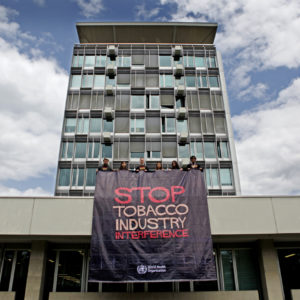While climate talks were groaning under the weight of industry political interference last November 2021–with hundreds of fossil fuel industry lobbyists roaming the halls, major fossil fuel exporters watering down the final treaty text, and rich countries failing to pay for their climate harms to the rest of the world–tobacco global treaty talks were quietly making critical progress thanks to safeguards against such interference.
Meeting virtually, the 184 parties to the global tobacco treaty (formally known as World Health Organization (WHO) Framework Convention on Tobacco Control or WHO FCTC) condemned Big Tobacco’s role in exacerbating the COVID-19 pandemic, implemented new disclosure guidance around conflicts of interest, and established an investment fund that should be resourced, in part, by a treaty article that holds the tobacco industry financially liable for its harms.
Put simply, the WHO FCTC is allowing governments to do their job and protect their people because it has made clear from the outset that “[t]here is a fundamental and irreconcilable conflict between the tobacco industry’s interests and public health policy interests” and that Big Tobacco has no place setting health policy. Article 5.3 of the WHO FCTC text, whether preventing Big Tobacco from writing tobacco control laws or serving as delegates to treaty talks, is now broadly viewed as the backbone of the treaty and its success.
These protections are paving the way for incredible progress in saving lives, lowering disease rates, and stopping tobacco addiction and use. And it is even paving the way for the previously unimaginable: lawsuits across the globe to hold Big Tobacco financially liable for its harms.
And these protections are not a result of happenstance, but dedicated organizing.
Addressing the elephant in the room
When the global tobacco treaty was first being negotiated in the early 2000s, it took a global coalition of some 100 organizations to secure its adoption over the objections of a U.S. government friendly to the interests of Big Tobacco.
In 2008, during the third Conference of the Parties (COP) of the WHO FCTC in Durban, when the time came to put teeth in treaty text discouraging industry interference, it again took an enormous lift. Many advocates and delegates feared that a concerted push to enshrine concrete protections against interference and conflicts of interest would derail progress on everything else. Many also figured Big Tobacco’s power was too strong to allow it.
They were right to have misgivings. After all, industry lobbyists were lurking in the negotiation halls. Government delegates with ties to industry were in attendance. And an industry front group had flown tobacco farmers in to make a spectacle across the road from the talks.
But to my belated father, Yul Francisco Dorado, former Director of Corporate Accountability Latin America Office and Kathy Mulvey, Corporate Accountability’s International Policy Director at the time, said there could be no global tobacco treaty progress until the very ugly elephant in the room was addressed. As colleagues have recounted to me, the two stood before a crowded room of advocates during a Framework Convention Alliance pre-COP training. There they made a plea to their peers about the urgency of securing protections against industry interference. Days later they would make a similar appeal to government delegates. Needless to say, their plea found incredible resonance, especially among advocates and officials from Global South countries that had long been most highly-impacted by Big Tobacco’s deadly tactics.
As civil society mobilized globally, government champions like the late Caleb Otto rallied official support, media tuned in, and finally treaty parties came to unanimous agreement on guidelines to prevent Big Tobacco from undermining the treaty.
It was one of those examples of Nelson Mandela’s famous adage, “it always seems impossible until it’s done.” Now the global tobacco treaty’s protections are clear in national laws. They are also protecting treaty negotiations themselves thanks to ongoing, dedicated organizing. Treaty parties are now asked to voluntarily disclose potential conflicts of interest.
Ending corporate capture of global policy
Today, Corporate Accountability partners with an impressive and growing array of advocates and academics to closely monitor Big Tobacco’s interference and the implementation of Article 5.3 WHO FCTC in national tobacco control laws. The Global Tobacco Industry Interference Index 2021, launched just prior to this year’s COP, as well as regional reports for Africa, Asia, Europe, and Latin America, are one example of how scrutiny of Big Tobacco’s political interference is only increasing.
And today, the precedent Article 5.3 WHO FCTC has set in tobacco control is helping animate calls within the UNFCCC to root out the deadly role of the fossil fuel industry in setting climate policy. It’s offering an alternative paradigm for global food governance. And it could well serve as a bedrock for preventing Big Pharma from co-opting a pandemic treaty slated for inaugural negotiations this March.
This, of course, is not to say that we’ve cleared the hurdle of tobacco industry political interference globally. Recent talks were still disrupted by delegates from countries like Guatemala and the Philippines operating seemingly as proxies for Big Tobacco. And recent exposés in Le Monde and BBC (thanks to the Bureau of Investigative Journalism and University of Bath) paint a troubling picture of how corporations like British American Tobacco, Philip Morris International, and Japan Tobacco continue to buy political favor, fund front groups, and engage in marketing dressed as philanthropy.
But unlike peers in aligned movements, health advocates have a potent tool for addressing such corporate wrongdoing in the form of Article 5.3 WHO FCTC. And as WHO Director General Dr. Tedros Adhanom noted in recent remarks on the illicit tobacco trade protocol, “like any tool, its power is only realized if we use it.”
That’s why Corporate Accountability and its partners are unceasing in supporting countries in wielding this tool to implement lifesaving policies. Together we can assure corporations answer to people, not the other way around.







